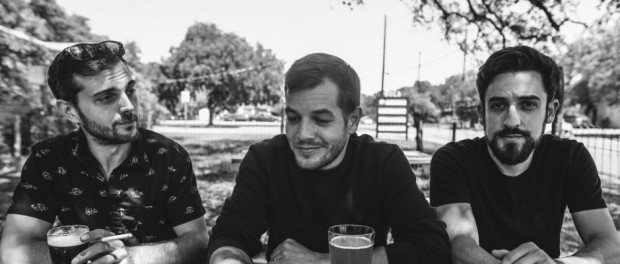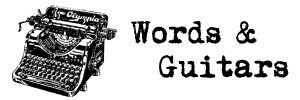In conversation: Courtesy Tier’s Omer Leibowitz

Within the musical aorta of Brooklyn resides Courtesy Tier, a new age blues rock band that blends the technicality and finish of high art with the rugged energy of southern bravado, all the while borrowing sonic heirlooms from locales such as Israel and West Africa.
Their debut LP Everyone’s OK dropped in August and is propelling the band across the transatlantic rock scene with hard-hitting blues riffs, melodic vocals and a jazz-inspired rhythm section.
After a few spins of this record, I needed to know more. Reaching out to guitarist and vocalist Omer Leibowitz, we discussed what inspires front-line musicians like themselves, what experiences transmogrify into audio recordings, and the outline of the future of their sound.
Words & Guitars: I’m a big believer that where one comes from, and the geo-spatial connections you have throughout your life have a big impact on the music in your life. Tell me a little bit about where you grew up and how you see that influencing your music.
Omer Leibowitz: Well, the thing about us is we have pretty different backgrounds across the board. Personally, I was born in Israel and lived there for a few years but also travelled with my family when they relocated to West Africa, and finally finished off high school in New Jersey. It’s difficult to be articulate about all of it together, how it combines to experience an individual, but growing up hearing different types of music definitely had an impact on me.
Can you tell me a little bit more about how Israel influenced you?
I was really young so I can’t pinpoint anything that specifically has I just know it has. I mean we listened to a lot of music from the US and UK in my household, all the rock and pop and all that. But being in the car with my grandfather when he was driving and listening to different Middle Eastern music, there’s an intangible that sort of sticks with you.
Were your parents big into the genres of music you listen to now or did you sort of discover it on your own?
I discovered a lot on my own or through friends or my older brother. But in Israel we didn’t get a whole lot of outside music back then so my dad would always come home from working abroad and bring albums home. So I remember him bringing back stuff like Queen, Paul Simon, Bob Dylan, Neil Young, really great music.
Layton, our drummer, we were in different bands for a while and we were a two piece until recently. He grew up outside of Philly so when I met him he introduced me to a lot of like Philly hip hop and Philly jazz. And even when he’s playing now, our rhythm section isn’t just rock: it’s got that hip hop and jazz feeling that shines through. It’s rock but it’s also inspired by jazz and hip hop.
I have to ask about West Africa as well because I am a huge fan the music from there – Malian Blues especially. Did the music from that region play a part in your musical formation?
I lived there for 5 years and definitely perceived it in my peripherals but at the time it wasn’t as big an influence. It was only when I was in college that I started going back to it and recognising the feeling of the sounds. I listened to a lot of blues like Ali Farka Touré and afrobeat like Fela Kuti, and started listening to the newer stuff as well like Tinariwen.
That’s great, I love all those guys, and was actually listening to some Fela Kuti today. I saw Tinariwen in concert in London a few years back and it blew my mind…but I digress. So fast forward to New York, how has this impacted your musical journey?
It affected me in a significant way, coming from music school in Boston which taught me a lot of technicality and instrumentation. New York taught me what was beyond the physical facility to make music, and that was about taste. It really gave us a schooling in taste and art, and we got into a whirlwind of different music and interests.
And one thing we started thinking about was how to fit our musicality into the scene there. We came from technical backgrounds and we still wanted to do things that were kind of out of fashion in the indie rock world like have long jam sessions and guitar solos. We wanted to find a way to learn what we can but also have our sound. Listening to other bands playing and getting deeper into acts like Lou Reed and Velvet Underground, and Patti Smith and Television really helped us broaden our vision more.
Now that you mention it that musical precision does really come through. It was kind of a je ne sais quoi factor as I was listening to the album a few times but I really think that you bringing that up has put it in to focus. Speaking of the album, a lot of bands have a central theme or idea they want to convey in their albums, what would you say that is about ‘Everyone’s OK’?
Well, in one way it really is just a collection of songs y’know? But there’s also the themes of relationships and struggle, and not just the typical boy-girl relationships, but relationships with growing up, with being a musician, finding your place in the world and trying to get a handle on it. You ask yourself, ‘what the hell am I doing?’ You manoeuvre through it and the growth and the pain and in the end though you kind of realise everyone is and everyone’s OK.
Your lead single, ‘Little Rock’, takes place early in, and as I have come to learn, is about a crossroads in your lives both personally and musically. Could you could talk about that a little more?
I mean for the band it really was a crossroads. Alex our bassist had just joined for a couple gigs, we didn’t really have any grand plans because Layton and I had been playing as a two-piece for 5 years and were kind of burning out. We got an offer to play at The Knitting Factory in Brooklyn and we decided to play with Alex again, and the gig went well and we got invited to SXSW.
Now Layton and I had played it a few times before so we weren’t very interested but Alex hadn’t so we decided to do a once more for him. We did a quick 8-9 show tour to warm us up to playing all the songs together and hit SXSW.
We played about 5-6 shows and on the final one we had some whisky and were just sort of playing our hearts out as almost a last hurrah when a guy heard us playing ‘Childish Blues’ from across the road and came over to introduce himself after the show. That guy is now our manager and is a great guy and really helped us form together as a new three-piece outfit and kept us going when we were about to quit. Now this has been a long way of saying that ‘Little Rock’ is the first song we wrote together as a three piece, but none of it would’ve happened if it weren’t for this series of events.
I’m glad you brought up ‘Childish Blues’ because it’s a favourite of mine on the album. I’m really curious though, what is it that makes these blues ‘Childish’? Do you feel new to the blues, do you feel like you haven’t found enough to have the blues about yet?
All that is a big part of it, and how that song was created was really just me in my room. I was unabashedly fucking around and put down some old blues standards and singing what I thought were, y’know, “blues things to sing about”. And it really felt like a joke, It was very simple and immature because I didn’t really believe myself, what do I know about the blues as this young white boy? But I played it to the band and they really liked it so we made it more believable and improved it. But the song is to me a lesson in humility, to just be straightforward when you’re writing.
The final song I want to ask about is ‘Home’, the final track of the album. It seems like such a perfect way to end the album, an idyllic finale. How did that song come to be in existence and where it is?
We were always playing it last live; it always really fit well into being played last and it just seems the best way to sum up anything, going home. It invokes nostalgia and it really changes things up from the tempo of the rest of the album which is a bit more uniform. So our idea with ‘Home’ and where it is, is to play something different to leave the listener wondering and wanting more of that style.
So is that what’s next for Courtesy Tier? More of that style of music?
Yeah, definitely. We wouldn’t want to change completely of course but the intention is to grow and evolve as a band. Do something a bit different, have more finger picking, more ballads, keep it heavier on that end of the next album maybe and keep things fresh and creative.
Last question that I like to end on, who are you listening to these days?
Jessi Robertson – you should check her out, she’s a total badass. Yankee Longstraw is another great one. Whitney is a new band getting some attention and they write the most beautiful songs. And of course I’m always listening the older stuff like Neil Young and Bob Dylan.
Keep up with Courtesy Tier via their website.
